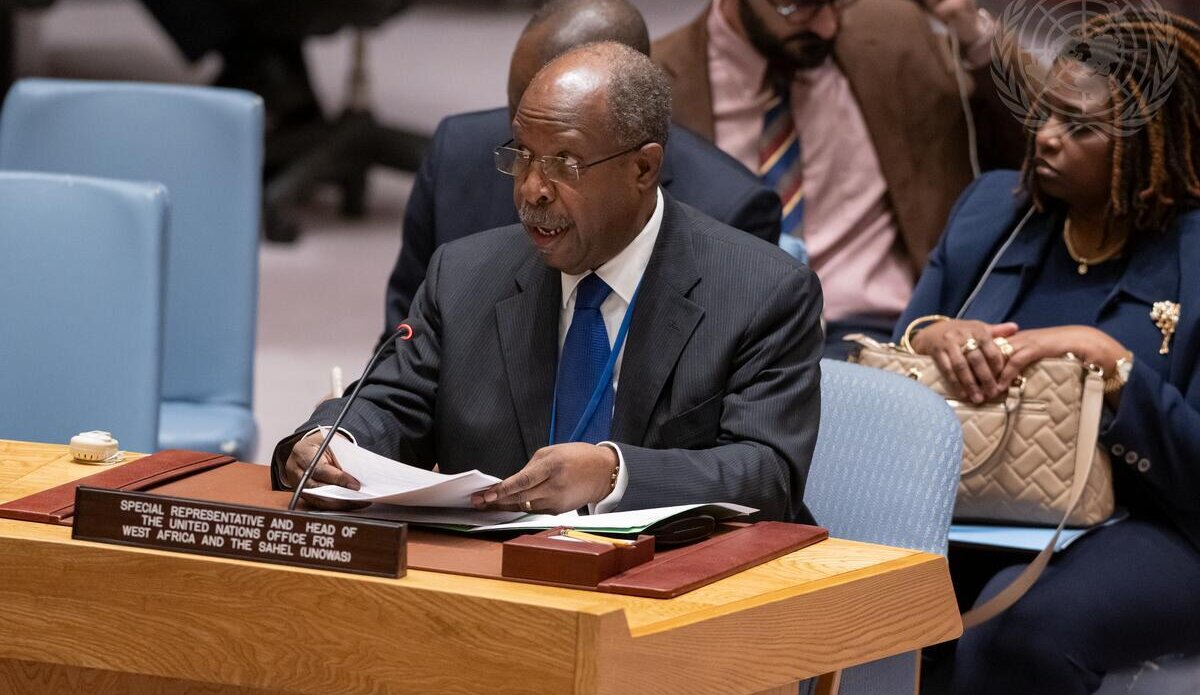At the United Nations Security Council, Special Representative Simão Reiterates UNOWAS' Commitment to Working with Regional and International Partners to Consolidate Peace, Security and Democracy in West Africa and the Sahel
The Special Representative of the Secretary-General and Head of the United Nations Office for West Africa and the Sahel (UNOWAS), Leonardo Santos Simão, yesterday presented to the United Nations Security Council the latest report of the Secretary-General on the activities of UNOWAS. The report covers the period from 30 June 30 to 31 December 2023.
Addressing the members of the Security Council, Mr. Simão evoked the persistence of socio-political tensions, the growing insecurity in the Sahel with a worsening of the humanitarian situation and the deficit of education systems, as well as the negative impact of climate change on peace and security in the sub-region. "Despite the significant progress that has been made in consolidating democracy, the security situation and governance challenges remain major concerns," he said.
Mr. Simão praised the successful conduct of the presidential election in Liberia, which "demonstrated the capacity of institutions to organize credible polls and to establish governments with constitutional legitimacy." But, the current political tensions in Sierra Leone and Guinea-Bissau, following electoral processes, "reminded of the need to build the credibility of institutions and processes of democratic governance, in a sustained manner, failing which, underlying fragilities are always likely to resurface one way or the other," he said.
In his statement, the Special Representative also expressed concern about the shrinking civic and political space in some countries of the subregion. "Regrettably, arrests of journalists and human rights defenders, as well as restrictions to internet access and freedom of the press, amongst other concerns, again fueled perceptions of a decline of the civic and political space in some countries," he said, while stressing the importance of respecting fundamental freedoms, "including freedom of assembly and expression, to build trust between citizens and institutions."
Also on the political front, and in view of the ongoing transitions, Mr. Simão reiterated UNOWAS' commitment "to continue advocating for dialogue to accelerate a return to constitutional order reflecting citizens’ aspirations and ensure transparency, inclusivity and respect for human rights in the management of the transition processes."
The Special Representative referred to the worrying security and humanitarian situation, particularly in Burkina Faso, Mali and Niger. "Despite marginal improvements in some areas, the number of people in the entire central Sahel region requiring humanitarian assistance and protection has increased by eight per cent compared to 2022, now reaching 34.5 million people," he said.
While acknowledging a stabilization, albeit precarious, in the Lake Chad Basin region thanks to the coordinated operations of the Multinational Joint Task Force, Mr. Simão warned of a possible "reconfiguration of regional security coordination mechanisms", following the closure of MINUSMA, the departure of foreign forces from the Sahel and the uncertainty over the G5-Sahel. He also expressed his satisfaction with the measures taken by the Economic Community of West African States (ECOWAS) "to make fully operational its Priority Action Plan 2020-2024 to eradicate terrorism in the region."
Speaking about the impact of climate change on peace and security in West Africa and the Sahel, it is “a reality that we cannot ignore,” he said, Mr. Simão briefed Security Council members on the results of climate risk assessments undertaken by UNOWAS which indicate that "climate change reinforces security risks by exacerbating inter-communal conflicts and social tensions."
Mr. Simão called for a greater participation of women. "It is imperative that women take their place in decision-making bodies," he stressed, while welcoming greater representation of women in legislative bodies in Benin, Côte d'Ivoire and Sierra Leone.
The Special Representative reiterated UNOWAS' commitment to working with regional and international partners to consolidate much-needed peace, security and democracy in West Africa and the Sahel. "Against the multiple challenges, UNOWAS will stay the course and deploy its capacities, using good offices, urging for humanitarian access, and promoting the observance of human rights and the rule of law," he pledged.
 UN
UN


